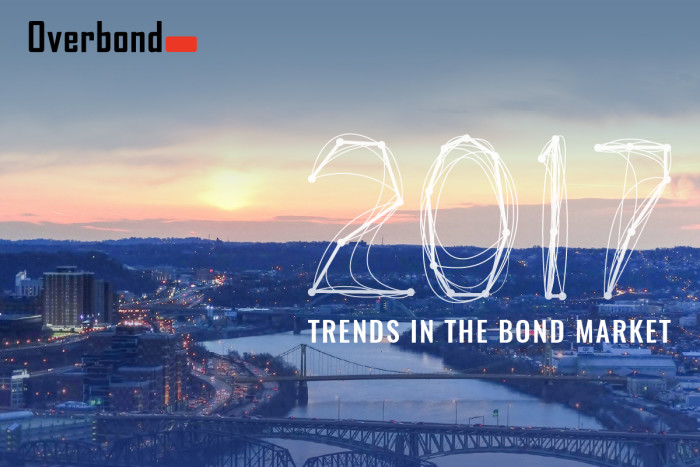
With a year of widespread volatility behind us, uncertainty will likely remain a key theme for 2017
Instability in the financial markets was a major theme for 2016. The second quarter saw record lows in bond yields after the shock of June’s referendum vote in the UK, however, markets have made a recovery in the months following the Brexit decision. To add fuel to the fire, the recent Trump election has caused bond yields to spike higher, predominantly due to increased inflationary expectations in the US. Global fixed income markets events throughout the past year have set the tone for significant changes in 2017, including the most recent Fed rate hike and a clear signal of additional hikes over the coming year. Here are some trends we expect to see in the upcoming months.
Increased power for buy side fixed income portfolios
2017 will see a further liquidity crunch, the slashing of dealer inventories and the increasingly limited market-making capacity in the secondary market. These factors will put the onus on large buy side portfolios to influence terms on rebalancing events when liquidity is needed. As non-traditional liquidity providers, the buy side is becoming incrementally more influential in the fixed income marketplace, and will need to start thinking about how to manage dealer and issuer accounts and relationships. The buy side has not traditionally been in this position, so this represents an important operating shift requiring these firms to be enabled with technology, measurable processes, KPIs and tools to operate in this new realm.
Yield environment reversal potential
It can be expected that global interest rates will rise on the back of the US curve adjustment and Fed rate hike schedule. It remains to be seen what rate strategy the European Central Bank and the Bank of Japan will assume, given the continued easing programs they have been undergoing. In addition, growth prospects and subdued inflation in the Eurozone, Japan, and the UK might indicate an unsupportive backdrop for higher interest rates globally. In 2016, we saw companies like Unilever and Toyota issue their corporate bonds at near 0% yields, and Henkel and Sanofi issue with negative yields. Further, as reported by Bloomberg, average corporate bond yields in Japan were reported at 0.17%, down from 0.33% a year earlier. It will be interesting to see if higher reference rates in the US will cause yield lend reversal in global fixed income markets.
Robust bond issuance
Corporate bond issuance will remain robust, however, it may contract marginally unless other factors, like M&A activity, come into play. Government bond issuance is likely to pick up the slack, as many governments will continue to take advantage of the relatively low interest rate environment. In North America, both Canadians and Americans are seeing a Prime Minister and President-Elect, respectively, who have committed to highly accommodative fiscal policy that includes large infrastructure spending financed primarily through the issuance of debt.
Financial technology growth
2016 saw financial institutions further embracing technology within their operations. Earlier this year, JP Morgan announced a target spend of $9.4 billion annually on technology, with 40% of this to be in their investments and technologies category. With many financial technology solutions being implemented in numerous areas of banking, including lending, payments, and wealth management, we expect fintech to begin increasing its importance in less-explored areas of banking services, including capital markets and regulatory/compliance.
About Vuk Magdelinic:
Before founding Overbond, Vuk’s career spans over 10 years in capital markets and technology. As PwC Risk and Regulatory consulting manager Vuk led large digital transformation programs at Deutsche Bank and BNY Mellon in New York City. Prior to that he worked at CIBC Fixed Income trading floor in Toronto in structured products origination capacity. Vuk has collaborated on numerous publications addressing key trends in fintech innovation. Vuk holds electrical engineering degree from University of Toronto, MBA from Ivey school of business and is an avid abstract painter.


